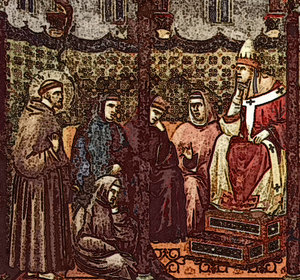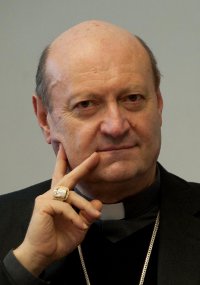 Last Sunday at the keynote address given by Father Julián Carrón who said among many other good things is that preaching is taking part in man’s search for God. Moreover, preaching arouses curiosity from within, that one of its aim is to overcome the divide between faith and life.
Last Sunday at the keynote address given by Father Julián Carrón who said among many other good things is that preaching is taking part in man’s search for God. Moreover, preaching arouses curiosity from within, that one of its aim is to overcome the divide between faith and life.
Tag: Pontifical Council for Culture
Vatican works more closely with Sport
 The Church is getting more deeply into sport laity with the John Paul II Foundation for Sport, and the Pontifical Councils for Culture and Laity. It is believed that sport as a privileged place for dialogue among church, culture and youth. Sport is healthy recreation and appropriate challenge. Sport is a point of reference of bettering oneself and the development of virtue.
The Church is getting more deeply into sport laity with the John Paul II Foundation for Sport, and the Pontifical Councils for Culture and Laity. It is believed that sport as a privileged place for dialogue among church, culture and youth. Sport is healthy recreation and appropriate challenge. Sport is a point of reference of bettering oneself and the development of virtue.
Representatives from the Pontifical Council for Culture and the Pontifical Council for the Laity held a press conference at the Vatican on Thursday, during which they presented the new lines of cultural approach to sport. The new approach is aimed at coming to an understanding of sport as a privileged place for dialogue among Church, culture and youth. The conference also provided an opportunity to present the Pontifical Council for Culture’s new Department dedicated to Culture and Sport, which will work closely with the Church and Sport Section of the Pontifical Council for the Laity, and the John Paul II Foundation for Sport. One of those who participated in the press briefing was Fr. Kevin Lixey, who is Responsible for the Church and Sport Section at the Council for the Laity. He told Vatican Radio recent, highly publicized scandals in major league sports – including betting scandals in Italy – make the announcement extremely timely. “On the one hand,” said Lixey, “we wanted to announce something we’ve been doing for the past year and a half,” adding, “it’s a moment for the Church to show that it is concerned.” Fr. Lixey went on to say, “[The Church] is actively working and interested in trying to stimulate a little bit more the pastoral work with sport,” on all levels, from youth leagues to international and professional compretition. “There is,” said Fr. Lixey, “still a lot of good in sport.”
Adult Stem Cell research, ethics –has support of the Catholic Church
His Holiness, Pope Benedict XVI met recently with the participants in the conference, “Adult Stem Cells: Science and the Future of Man and Culture,” meeting 9-11 November, in Rome. The Pope’s November 12th address can be read here where he underscores the unique opportunity to discover the beauty of human life in all its complexities through the work of science. He points out that there are possibilities for the healing of chronic degenerative illnesses. He advocates for an ethic that respects the integral good of human life and the common good of society, especially citing Dignitas Personae.
Adult Stem Cells: Science and the Future of Man and Culture: a deeper dialogue between science and faith
Court of the Gentiles –Le Parvis des Gentils à Paris: a call to fraternity to believers and nonbelievers to live coherent in Christ, and for a new humanity
 Cardinal Gianfranco Ravasi’s interview on the importance of the Court of the Gentiles for us. This is probably the single most significant initiative of the Pontifical Council for Culture taking seriously the place of belief and unbelief. The Pope some time ago asked the pastors of the Church to take atheism as a serious matter to engage in. And by atheism he’s not suggesting the Christopher Hitchens’ version of atheism but what might be called “honest atheism,” those who ask sincere questions of belief and who are seeking to live a coherent life. The Pope is brilliant in his call to respect, dialogue and living.
Cardinal Gianfranco Ravasi’s interview on the importance of the Court of the Gentiles for us. This is probably the single most significant initiative of the Pontifical Council for Culture taking seriously the place of belief and unbelief. The Pope some time ago asked the pastors of the Church to take atheism as a serious matter to engage in. And by atheism he’s not suggesting the Christopher Hitchens’ version of atheism but what might be called “honest atheism,” those who ask sincere questions of belief and who are seeking to live a coherent life. The Pope is brilliant in his call to respect, dialogue and living. I know that at the invitation of Cardinal André Vingt-Trois, the Archbishop of Paris, and of Cardinal Gianfranco Ravasi (seen right), the President of the Pontifical Council for Culture, you are gathered in great numbers in front of the Cathedral of Notre Dame in Paris. I greet all of you, together with our brothers and friends from the Taizé Community. I am grateful to the Pontifical Council for having taken up and extended my invitation to open a number of “Courts of the Gentiles” within the Church. This image refers to the vast open space near the Temple of Jerusalem where all those who did not share the faith of Israel could approach the Temple and ask questions about religion. There they could meet the scribes, speak of faith and even pray to the unknown God. The Court was then an area of separation, since Gentiles did not have the right to enter the consecrated area, yet Jesus Christ came to “break down the dividing wall” between Jews and Gentiles, and to “reconcile both to God in one body through the cross, thus putting to death that hostility in himself”. In the words of Saint Paul, “He came and proclaimed peace…” (cf. Eph 2:14-17).
I know that at the invitation of Cardinal André Vingt-Trois, the Archbishop of Paris, and of Cardinal Gianfranco Ravasi (seen right), the President of the Pontifical Council for Culture, you are gathered in great numbers in front of the Cathedral of Notre Dame in Paris. I greet all of you, together with our brothers and friends from the Taizé Community. I am grateful to the Pontifical Council for having taken up and extended my invitation to open a number of “Courts of the Gentiles” within the Church. This image refers to the vast open space near the Temple of Jerusalem where all those who did not share the faith of Israel could approach the Temple and ask questions about religion. There they could meet the scribes, speak of faith and even pray to the unknown God. The Court was then an area of separation, since Gentiles did not have the right to enter the consecrated area, yet Jesus Christ came to “break down the dividing wall” between Jews and Gentiles, and to “reconcile both to God in one body through the cross, thus putting to death that hostility in himself”. In the words of Saint Paul, “He came and proclaimed peace…” (cf. Eph 2:14-17).
